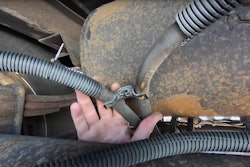Trucking news and briefs for Monday, Dec. 26, 2022:
FMCSA denies petition to allow hair drug testing reports to Clearinghouse
The Federal Motor Carrier Safety Administration has denied a request from the Trucking Alliance to "amend the definition of actual knowledge to include the employer's knowledge of a driver's positive hair test, which would require such results be reported to the FMCSA Drug and Alcohol Clearinghouse and to inquiring carriers.”
Trucking companies who have "actual knowledge" of a driver's positive urine drug test are currently required to report that test result to the Clearinghouse.
In its application for exemption, the Trucking Alliance said it believes that because hair testing is more reliable and accurate than urine testing, it is the “appropriate drug testing method for preemployment and random testing protocols.”
In denying the petition, FMCSA said it lacks the statutory authority to grant the exemption request to amend the definition of actual knowledge to include the employer's knowledge of a driver's positive hair test.
The Department of Transportation, including FMCSA, is required to follow the Department of Health and Human Services’ (HHS) Mandatory Guidelines for technical and scientific issues related to testing for controlled substances. Because HHS has not yet issued final guidelines for hair testing, FMCSA cannot grant the exemption.
The FAST Act transportation bill, signed into law by President Obama in December 2015, allows for hair follicle drug testing as a DOT-approved method, but not until HHS establishes guidelines for testing. The FAST Act mandated that those guidelines be developed within a year of the FAST Act becoming law, but HHS did not publish proposed guidelines until September 2020. HHS has not yet issued a final version of those guidelines.
The Trucking Alliance is made up of a group of large carriers, including Cargo Transporters, Dupré Logistics, Frozen Food Express, J.B. Hunt, KLLM, Knight Transportation, Maverick Transportation, Schneider, Swift Transportation, U.S. Xpress and May Trucking Company.
FMCSA denies training exemption requests
The Federal Motor Carrier Safety Administration has denied petitions from two truck driving schools seeking waivers from certain provisions of the Entry-Level Driver Training regulations.
SBL Truck Driving Academy sought an exemption from the theory and behind-the-wheel instructor requirements contained in the ELDT regs for two of its instructors. SBL specifically requested an exemption from the requirement that instructors have at least two years of experience driving a commercial motor vehicle requiring a CDL of the same or higher class and/or the same endorsement level for which training is to be provided.
FMCSA said in its denial that SBL “presented insufficient evidence to establish that not complying with the provisions of the ELDT regulations relating to driving experience requirements for CMV instructors would meet or exceed the level of safety achieved by complying with the ELDT regulations.”
A separate request from the Western Area Career and Technology Center (WACTC) also sought an exemption from the theory and behind-the-wheel instructor requirements in the regulations. The provider said in its request it wanted to use an instructor with less than two years of CDL driving experience, adding that it has been difficult to find qualified instructors. WACTC stated in its request that the instructor would meet the ELDT regulation’s requirement for two years of driving experience with a Class A CDL in August 2022.
FMCSA said if it allowed “an individual instructor to provide ELDT without the required driving experience, it could open the door for similar exemption requests on a widespread basis,” which would go against the goal of the regulations, the agency added. Additionally, because the instructor in question met the two-year requirement in August, the request is now moot.
Volvo recognizes first EV Certified Dealership in Ohio
Volvo Trucks North America has expanded its network of Volvo Trucks Certified Electric Vehicle (EV) Dealers into Ohio, announcing that Young Trucks, a fourth generation, family-owned dealership, has recently completed the required training and certification program.
The designation signifies that the dealership is ready to support customers around its Canton, Ohio, location who are interested in adding Volvo VNR Electric trucks to their local and regional distribution, pickup and delivery, and food and beverage distribution routes.
“Adding our 10th state to the Volvo Trucks Certified EV Dealer network is the perfect way to close out a year that has seen significant expansion of the electromobility ecosystem that is necessary to support battery-electric trucks,” said Peter Voorhoeve, president, Volvo Trucks North America. “Our dealerships play a critical role for fleets in every stage of the transition to battery-electric trucks — from selecting the right vehicle configuration to securing incentive funding when available, and then ensuring customers can maximize their uptime once the trucks are deployed.”
Two of Young Trucks’ technicians have completed Volvo Trucks’ hands-on training course that demonstrates how to safely maintain and repair electric drivetrains and components.
Additionally, the dealership has invested in the necessary diagnostic tools for its maintenance bays, and its service team has been outfitted with the personal protective equipment necessary to work with high-voltage systems. Young Trucks has dedicated one service bay for battery-electric trucks with plans to expand as adoption of the Volvo VNR Electric truck increases in the region.
Young Trucks opted to utilize a portable 50 kW Heliox charger to support charging its customers’ Volvo VNR Electric trucks. The portable charger provides the flexibility to move it to other bays, as needed. In addition, the charger has lower power requirements, enabling the dealership to use its existing electrical service and fast-track its infrastructure deployment timeline.











